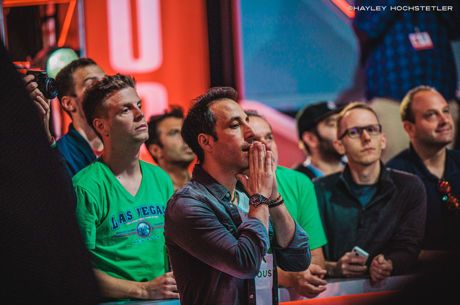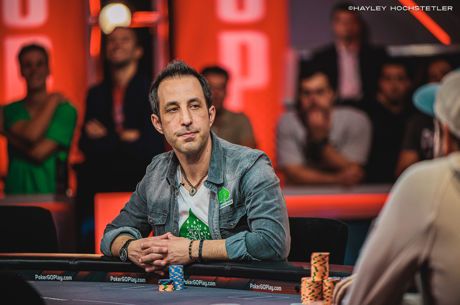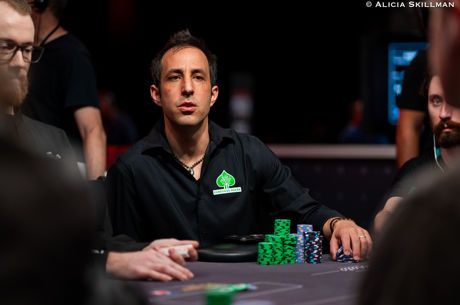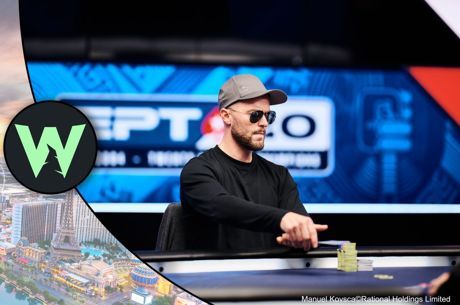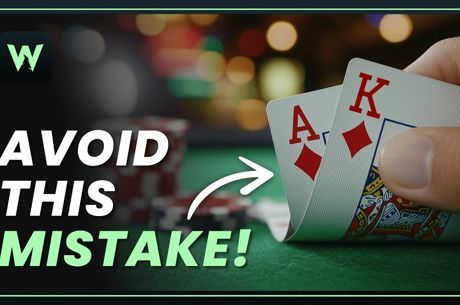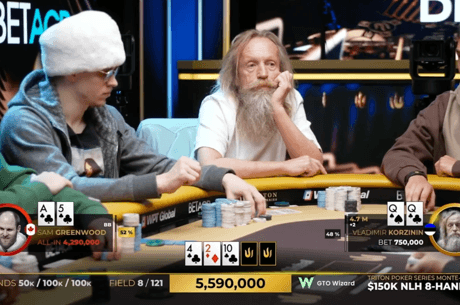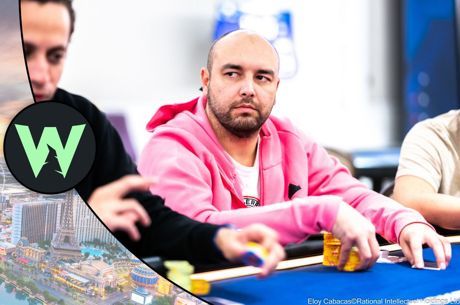What's the One Poker Hand from the 2023 WSOP Main Event Alec Torelli Will Think About for Years to Come?
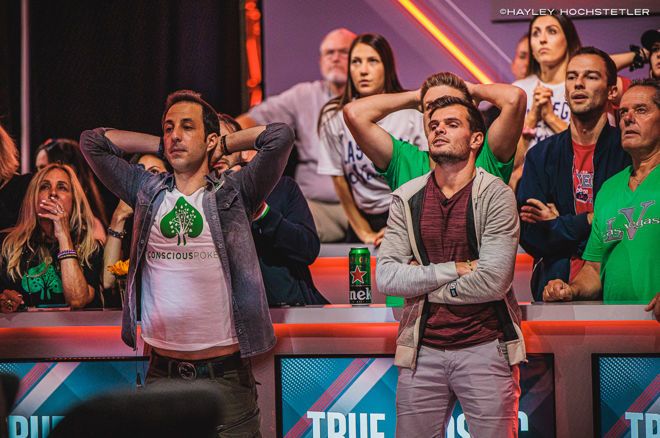
Table Of Contents
When Day 7 of the 2023 World Series of Poker (WSOP) Main Event began, I found myself sitting with a commanding 21,000,000 in chips with just 49 players left. The blinds kicked off at 125,000/250,000 with a 250,000 big blind ante, giving me nearly 100 big blinds and a top five stack.
Before we get into Day 7 action, check out some big hands from earlier in this series:
- Alec Torelli’s WSOP Main Event Run Day 1C: Actionable Ways to Maximize Value
- Alec Torelli Rivered the Nuts on Day 2 of WSOP But Needed to Decide What to Bet
- Alec Torelli on Using Live Reads on Day 3 of the WSOP Main Event
- A Crucial Read Puts Torelli in Commanding Position in 2023 WSOP Main Event Day 4
- Two Tournament-Defining Hands Alec Torelli Played on Day 5 of the 2023 WSOP Main Event
- Alec Torelli's Aces Cracked on Day 6 of the WSOP Main Event But Soon Sets Up Chip Leader
Despite being deep in the tournament, Day 7 should be easier than the previous ones. The pay jumps and final table bubble are in full effect, allowing my big stack to apply pressure on shorter ones and cruise toward Day 8. Or so I thought.
My expectations were shattered the moment I woke up. It was before 7:00 a.m., and although I went to bed less than six hours earlier, I couldn’t rest. Perhaps it was nerves or adrenaline, but I felt off for the first time in the seven-day battle. I tried to shake it off with my usual morning routine of meditation, exercise, and pregame strategy prep. It helped, but I knew I was not 100% when I sat down at my table.
"I wasn’t completely in flow, that soft, meditative state where the current hand is in color, and the rest of the world is a distant black and white."
As many of my readers know, I document every hand I play during my tournaments. That leaves me with some 60+ hands per day to review. As I studied them all once again in preparation for today’s piece, I had mixed feelings about my play. It’s not that I did anything particularly bad, save perhaps for the final hand of the night, but perhaps I also lacked the finesse of the previous days.
I wasn’t completely in flow, that soft, meditative state where the current hand is in color, and the rest of the world is a distant black and white. Playing in flow feels like watching a captivating TV show where you tune out the entire world around you.
It’s from that state that I’m able to play my best poker, making plays in tune with the current situation at hand. It’s a degree of finesse that can’t quite be recounted in the technical details of a hand, because the emotions, state, and energy of the people around you cannot be sufficiently captured on paper, and therefore the “correct” play is lost in this translation.
Such is the way I navigated the Main Event for the previous six days. On Day 7, however, I was just not there. I’d have to play a more technical game, one that I’m comfortable with, but that lacks the extra edge I needed to continue gliding through the field. And so, my biggest rollercoaster of the tournament began.
Clashing with Adam Walton
The first two-hour level was uneventful. I moved tables twice and made my way up to 23,000,000 when the following hand took place.
The blinds escalated to 150,000/300,000/300,000. The action folded to me on the button, and I opened to 650,000 with 9x5x.
I know it’s technically a fold, but I reasoned that the small blind is short, and won’t three-bet without a premium holding, allowing me to steal wider. When you’re a big stack deep in a tournament, shorter stacks feel an inordinate amount of pressure and tend to play exceptionally tight. Rightly so, it’s the correct strategy.
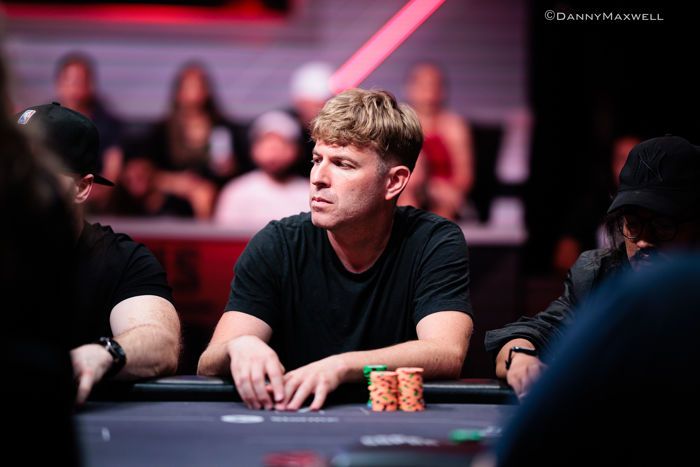
What I failed to realize, as I had never played with him before, was that Adam Walton (the eventual third-place finisher) was in the big blind. He had a comparable stack to mine and wasn’t afraid to use it.
He defended and we went heads up to the flop, which came down K♣3♥2♣. He checked and I followed it up with a continuation-bet of 375,000.
I elected for a small sizing as the dry board texture meant I was betting with most hands. If he didn’t connect, he’d simply fold, meaning there’s no reason to be inefficient in risking more chips. Adam called.
The turn came an offsuit ace, the perfect card for me to barrel. I fired a solid bet of 1,600,000 into the pot of 2,500,000. A sizable bet on this card put Adam in a tough spot with all of his under pairs as well as Kx, which were now behind any of my top pair holdings. I expected a fold often and felt comfortable with my play.
When Adam glanced at my stack, however, I knew I was in trouble. To my surprise, he put in a big raise to 7,200,000, essentially forcing me to commit myself to the pot or fold. Of course, I let it go.
I wouldn’t be upset if he turned aces up or a straight, as this would be a natural way to play the hand, but when I found out he had 7x7x, I was a bit distraught. Did I give away a tell?
I planned to review the tape later and watch for every detail, but in the moment I had to shake it off and continue the fight. Unfortunately, I dipped down to 12 million, losing small pot after small pot.
Check out Alec Torelli's strategy articles on PokerNews here!
Wife to the Rescue
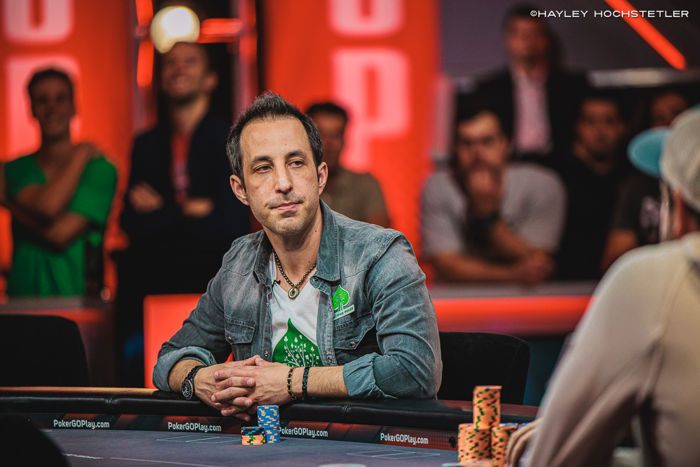
My wife pulled me aside on a break.
“Eat this,” she said. “I can see you’re not 100% today. You need some energy.” I realized I had hardly eaten all day and was running on fumes. Like she has so many times before in my poker career, Ambra came to my rescue.
I then turned things around and thrust myself back to 19 million. When we returned from dinner, the blinds swelled to 250,000/500,000/500,000 and we were playing six-handed while waiting for tables to balance. My 38th documented hand of the day then took place.
With fewer players, starting hands increased in strength and people became more aggressive. Preflop ranges were much wider, which changed the entire post-flop dynamic too. Floats were more common, as were bluffs on later streets.
I was dealt AxQx on the button and bumped it up to 1.1 million. Toby Lewis, a British pro who ended up finishing in sixth place defended in the big blind.
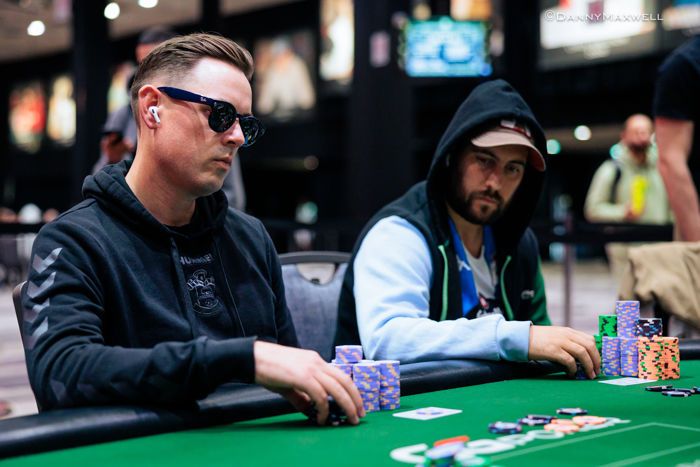
The flop came down Kx8x4x rainbow. He checked I followed it up with a continuation-bet of 900,000, and he called. The turn was Kx, bringing a flush draw and we both checked. The river brought hope with a Qx.
Things changed however when he overbet 4 million into a pot of 3 million. The book says to call (I’ve run the sim), but my instinct told me he wouldn’t bluff for this size, on this board, at this stage of the tournament.
If he missed a draw with something like 7x6x, why not fire 30% of the pot? I leveled myself into thinking he was betting big to force me off ace-high or a mid-pair like 8xXx, 9x9x-JxJx, whereas a smaller bet wouldn’t succeed, and that I had one of the best hands I could have, which meant I had to call. Of course, that’s not the framework that matters most in spots like these, and I paid the price when he shows me Kx7x.
Redemption was near, however. On the last hand before the break, another British pro, Andrew Hulme, raised under the gun to 1.2 million, and I defended the big blind with 9♠7♠. The flop came Jx8x8x and we both checked. The turn brought a 10x, giving me a straight, and I checked again.
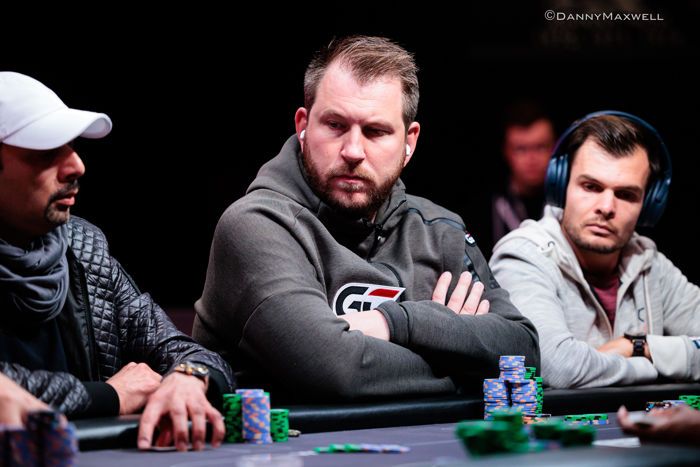
Hulme fired 1.9 million into a pot of 3.2 million. Instead of check-raising, I decided to call, disguising my hand. The river came a blank deuce, and I checked once more. Hulme bets 5.4 million.
Using the game flow, my read, and analyzing the betting, I was almost certain I was good. But will he call it off if I raise? I took an extremely unconventional line, and perhaps he would think I’m turning a 9x or Tx hand into a bluff. It’s never easy to pull the trigger and put it all on the line based on your read. If I was wrong, not only would I be out of the tournament, but I would feel like an idiot for not just flatting.
I found the sense and courage to trust myself and announce “all in” for 12.9 million total. Those first few seconds were the most stressful of the day, as I knew I needed to fade a snap-call. Hulme had me covered by a few big blinds. If I was wrong, it was all over.
When ten seconds went by, I was relieved. I put my head down to avoid giving anything away.
Hulme tanked well into the break. Everyone had left the table. It was just us, the cameras, and both of our rails waiting anxiously in the stands. He tried talking to me, but I remained silent. He talked to himself instead, sitting up in his chair, standing, and then sitting again. Finally, reluctantly, he moves his stack into the middle.
“Straight,” I announced, turning over my hand. His face said it all. I let out a lot of emotion. I laid the perfect trap, and it paid off. Fewer than 20 players remained, and I just recovered everything for the entire day, and then some. Sitting on 33 million in chips my dream of the final table felt inevitable.
Aiming for the Final Table
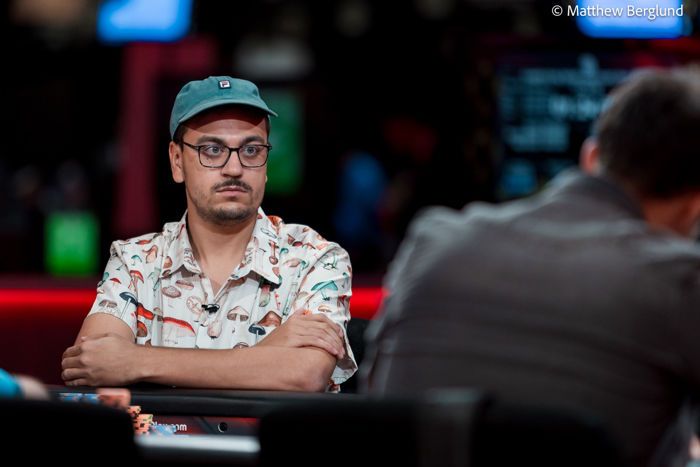
Shortly after, we redrew tables and once again I was at the featured one. I tried to put my stack to work, opening several pots in late position, but aggressive three-bets forced me to fold. The blinds increased to 300,000/600,000/600,000 and it was late. Mistakes are bound to happen.
Sachin Joshi intended to raise from under the gun, but accidentally puts in the wrong chips, forcing him to limp. I look down at the K♣J♣ in the cutoff and considered my options. I thought about raising to 2 million, but I didn't want to face a shove if he jammed. I was fine to play small ball and lower variance at this stage of the tournament, so I limped behind.
Daniel Weinman then checked in the big blind and we went three ways to the flop. It came down K♠10♣2♦. Weinman checked, Joshi fired out a bet of 750,000, and I called, as did Weinman.
The turn was the 7♣, giving me a flush draw. Weinman checked and then Joshi bets 3 million. I was quite sure my hand was good on the flop, but this bet threw me for a loop. Joshi is leading into two solid players when it is likely one of them has a king (in fact, we both did). Would he really do that with complete air?
It didn't matter. I picked up the backdoor flush draw and still had position, so I couldn't do anything but call. Weinman got out of the way. I was quite sure he’s folded a king, making it even less likely Joshi had one.
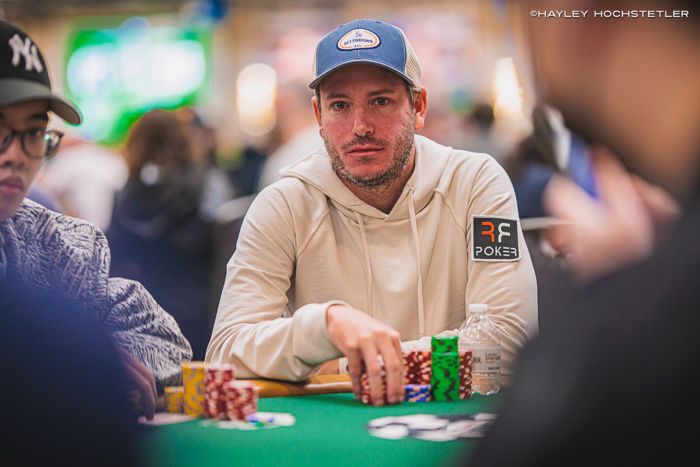
I knew at that moment that so much of my tournament came down to a single river card. I prayed for a club, but poker is rarely that easy. It was an innocent 2x instead. The best I could do was hope for a check. Another bet from Joshi represented a lot of strength and was either a stronger hand or complete air.
He fires 9 million, leaving himself just a few big blinds. I replayed the action. Since he intended to raise under the gun, he could still have hands like AxKx, AxAx, and 10x10x for value. Of course, I could still beat all of his bluffs, such as AxQx, AxJx, QxJx, and clubs, although the J♣ in my hand blocked some of those.
"But it was if a movie was happening in slow motion and I couldn’t find the remote to hit pause, I found myself putting my chips in the middle."
I shouldn’t need to reason this far. My turn call looked strong, and he should know I had at least a king, if not better. Why play seven days and bluff into such a strong range? I tried to center myself and think some more. All the above seems so obvious in hindsight. Just fold, lower variance, wait for a redraw tomorrow, come back when I’m fresh, and find a better spot.
But it was if a movie was happening in slow motion and I couldn’t find the remote to hit pause, I found myself putting my chips in the middle. I was surprised to see him turn over pocket sevens. I don’t think I could have ever put him on that given the flop action, but
I still should have been able to get away from it.
I was devastated. I knew right then it was one of those hands I’ll replay and question for years to come, similar to how I’m still haunted by losing with ace-queen vs. pocket tens on the final table of the World Poker Tour at Bellagio nearly 15 years ago. Why didn’t I just call preflop instead of flipping for everything with four left?
The clock touched zero for the night. With 15 players remaining I was in 11th place reaching Day 8 with 15 big blinds. Aside from the marginal ace-queen call earlier in the day, the king-jack hand was the only other one I questioned during the entire seven days. Despite playing some of the best poker of my career, only Day 7 and the blunder were caught on camera for everyone to see, and it will likely be a defining moment in my Main Event journey.
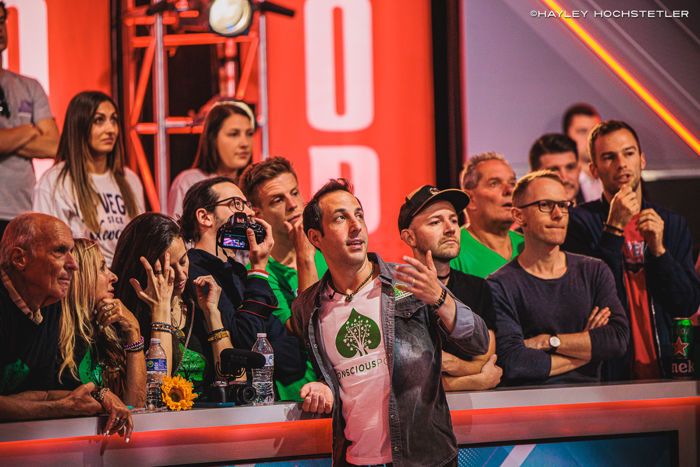
Tournament poker is ruthless because you’re always one hand and one decision away from busting. As the saying goes, "You’re only as good as your last at-bat." The energy on my rail was different. I knew I’d let them and myself down. Despite all my training, both physically at the gym and on the track and mentally with meditation and visualization, in the last hour of the seventh day, I was just not quite good enough.
There was an odd sense of wonder and humility that came over me as I headed back to my room. No matter how hard I try and work, even after 20 years of playing poker, there’s always more that I can do to improve. At this point, I had nothing left to lose. The pressure was gone and I slept well. I was still in the battle and vowed to take it one hand at a time, doing my best to enjoy whatever came next. For better or worse, in tournament poker, you’re always one double away from a shot at victory, and we all know anything can happen.
The following day was a new day, and I had to wait to see what the cards brought. Stay tuned for the next article in the series where I break down the action from Day 8.
In the meantime, and for daily poker updates and hand reviews.For more awesome poker content, including our free weekly newsletter, check out .
Also, This series is the teaser for a WSOP Tournament Masterclass course I'm releasing to help others excel in tournaments.
.
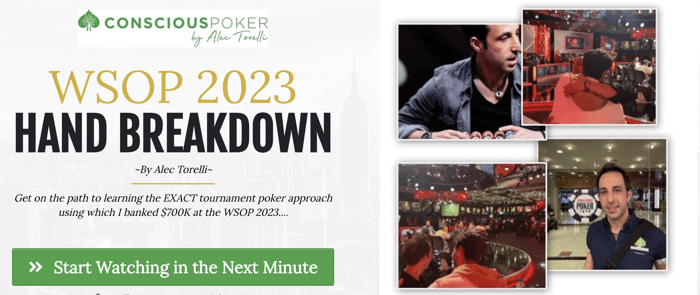
Alec Torelli has been playing high-stakes poker professionally since 2006. With over $2.2 million in tournament winnings and millions more in both live and online cash games, Alec is one of the most respected poker players in the industry today. He has been featured on ESPN, CBS Sports, Travel Channel, Fox Sports, Cigar Aficionado, PokerNews, and many more.
In 2015, Alec founded to teach poker players how to improve their game, move up in limits, and achieve their poker goals. Since then, Alec has coached nearly a hundred players both in person and virtually, and thousands more have taken his programs to take their game to the next level.

